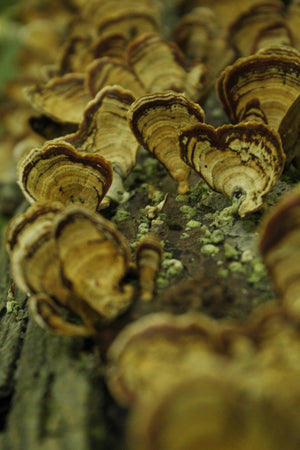Everything you need to know about turkey tail mushrooms
Apr 01, 2025
Turkey tail mushrooms (scientifically known as Trametes versicolor) have gained popularity for their numerous health benefits. These mushrooms are packed with antioxidants, polysaccharides, and immune-boosting compounds. They have been used for centuries in traditional medicine, and modern studies continue to highlight their potential. In this guide, we will explore everything you need to know about turkey tail mushrooms, from their benefits to potential side effects and dosage recommendations.
Overview
Turkey tail mushrooms are a type of fungi that grow on decaying wood, particularly in forested areas. They are named for their striking, fan-like appearance, which resembles the tail feathers of a turkey.
Turkey tail mushrooms have long been used in traditional Chinese medicine, and they are now widely available as supplements, powders, and extracts. Research suggests that these mushrooms are packed with beneficial compounds, making them a valuable addition to any wellness routine.
Are turkey tail mushrooms edible?
Turkey tail mushrooms are edible but are typically consumed in powdered form or as supplements, such as capsules. While you can technically eat them fresh, it's better to extract their beneficial compounds for improved absorption.
Turkey tail vs. false turkey tail: What’s the difference?
It’s important to distinguish between turkey tail mushrooms and their look-alike, the false turkey tail mushroom. While they may appear similar at first glance, the false turkey tail is not typically used for medicinal purposes and lacks the same health benefits.
To identify the true turkey tail mushrooms, look for their distinct, colorful, concentric bands of brown, orange, and white. The true turkey tail has a soft, flexible texture and is often found growing on decaying wood.
The false turkey tail, on the other hand, has a thicker, more leathery texture and may have a duller, less vibrant color pattern. It typically grows on hardwoods in more humid environments.
Turkey tail benefits
Turkey tail mushrooms offer a wide range of health benefits, backed by both traditional use and modern science. Let’s take a look at some of the most notable turkey tail mushroom benefits.
Cancer-fighting potential
One of the most researched benefits of turkey tail mushrooms is their potential to fight cancer. Studies have shown that turkey tail contains compounds that may enhance the immune system's ability to target cancer cells [1].
Research indicates that polysaccharides in turkey tail, like PSK and PSP, can help improve the body's immune response. These compounds have shown promise in improving survival rates when used alongside traditional cancer treatments [2].
Skin health benefits
Turkey tail mushrooms are also praised for their potential to improve skin health. They contain antioxidants that can help reduce inflammation and fight oxidative stress, which is a major contributor to aging skin [3] [4].
Additionally, studies have shown that extracts from turkey tail mushrooms can enhance the modification of histone proteins. These proteins play a key role in regulating gene expression in our cells. By influencing these proteins, the mushroom extracts may affect gene activity, potentially impacting aging and age-related diseases [5].
RELATED: Genomic instability: The DNA damage driving aging
Antimicrobial properties
Turkey tail mushrooms have antimicrobial properties, which can help combat harmful pathogens in the body. This makes them valuable for supporting the immune system and protecting against infections. Their natural compounds may also inhibit the growth of bacteria, viruses, and fungi [3] [6].
Gut health benefits
Turkey tail mushrooms are rich in prebiotics, which are beneficial for gut health. Prebiotics help nourish the beneficial bacteria in your digestive system, supporting a balanced microbiome. By improving gut health, turkey tail mushrooms can help with digestion, reduce inflammation, and support overall well-being [7] [8].
RELATED: Microbiome dysbiosis: A hallmark of aging and the gateway to longevity
Turkey tail side effects
While turkey tail mushrooms are generally safe for most people, there are some side effects to be aware of. Some people may experience mild digestive discomfort, including bloating or gas, when first using turkey tail supplements. In rare cases, individuals with mushroom allergies may experience an allergic reaction.
Special precautions and warnings
If you have any pre-existing health conditions, such as autoimmune disorders, or if you are pregnant or breastfeeding, it’s important to consult a healthcare provider before using turkey tail mushrooms. They may interact with certain medications, especially immune-suppressing drugs, so it’s always best to check with a doctor if you are unsure.
Where to find turkey tail mushrooms
Turkey tail mushrooms are commonly available in dried or powdered form, which you can find at health food stores or online. In nature, they grow on dead trees and logs in temperate forests.
If you prefer a more convenient option, turkey tail mushroom extracts or capsules are also widely available. These supplements make it easy to benefit from turkey tail mushrooms without having to forage or prepare them yourself.
Dosage
The proper dosage of turkey tail mushrooms can vary depending on the form you’re using. For turkey tail mushroom capsules, typical dosages range from 500 mg to 1,500 mg per day. However, it's essential to follow the manufacturer’s instructions or consult a healthcare professional for personalized advice.
Summary
So what is turkey tail mushroom good for? Turkey tail mushrooms offer numerous health benefits, from enhancing immune function to supporting skin and gut health. While they are generally safe for most people, it's important to be aware of potential side effects and consult a healthcare provider if you have health concerns. Whether you choose to consume them fresh, in supplement form, or as an extract, turkey tail mushrooms can be a valuable addition to your wellness routine.
READ NEXT: Reishi mushroom: What is it, benefits, and side effects
FAQ
What does turkey tail mushroom do to you?
Turkey tail mushrooms can potentially support immune health, improve gut function, and may have cancer-fighting properties. They also may promote healthy skin and provide antimicrobial benefits.
Who should not take turkey tail mushrooms?
People with mushroom allergies or those on immune-suppressing medications should avoid turkey tail mushrooms. Pregnant or breastfeeding women should consult a healthcare provider before use.
What cancers do turkey tail mushrooms fight?
Turkey tail mushrooms have shown potential in fighting various cancers, including breast, colon, and gastric cancer. They may enhance the immune response to cancer cells.
Is turkey tail better than lion's mane?
Both turkey tail and lion's mane mushrooms offer unique health benefits. While turkey tail focuses more on immune support and cancer prevention, lion's mane is known for boosting brain health and cognitive function. The choice between the two depends on your specific health goals.
References
[1] Dan, A., Swain, R., Belonce, S., & Jacobs, R. J. (2023). Therapeutic Effects of Medicinal Mushrooms on Gastric, Breast, and Colorectal Cancer: A Scoping Review. Cureus, 15(4), e37574. https://doi.org/10.7759/cureus.37574
[2] Darshan, K., Sagar, S. P., Vajramma, B., Shreedevasena, S., Ashajyothi, M., Asaiya, A. J. K., & Mishra, S. N. (2024). Medicinal potential of turkey tail mushroom (Trametes versicolor): A comprehensive review. South African Journal of Botany, 172, 254-266. https://doi.org/10.1016/j.sajb.2024.07.013
[3] Camilleri, E., Blundell, R., Baral, B. et al. A comprehensive review on the health benefits, phytochemicals, and enzymatic constituents for potential therapeutic and industrial applications of Turkey tail mushrooms. Discov Appl Sci 6, 257 (2024). https://doi.org/10.1007/s42452-024-05936-9
[4] Teymoorian, S. K., Nouri, H., & Moghimi, H. (2024). In-vivo and in-vitro wound healing and tissue repair effect of Trametes versicolor polysaccharide extract. Scientific reports, 14(1), 3796. https://doi.org/10.1038/s41598-024-54565-0
[5] Yi, S.-J., & Kim, K. (2020). New Insights into the Role of Histone Changes in Aging. International Journal of Molecular Sciences, 21(21), 8241. https://doi.org/10.3390/ijms21218241
[6] Bains, A., & Chawla, P. (2020). In vitro bioactivity, antimicrobial and anti-inflammatory efficacy of modified solvent evaporation assisted Trametes versicolor extract. 3 Biotech, 10(9), 404. https://doi.org/10.1007/s13205-020-02397-w
[7] Pallav, K., Dowd, S. E., Villafuerte, J., Yang, X., Kabbani, T., Hansen, J., Dennis, M., Leffler, D. A., Newburg, D. S., & Kelly, C. P. (2014). Effects of polysaccharopeptide from Trametes versicolor and amoxicillin on the gut microbiome of healthy volunteers: a randomized clinical trial. Gut microbes, 5(4), 458–467. https://doi.org/10.4161/gmic.29558
[8] Jayachandran, M., Xiao, J., & Xu, B. (2017). A Critical Review on Health Promoting Benefits of Edible Mushrooms through Gut Microbiota. International Journal of Molecular Sciences, 18(9), 1934. https://doi.org/10.3390/ijms18091934


